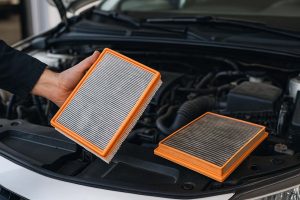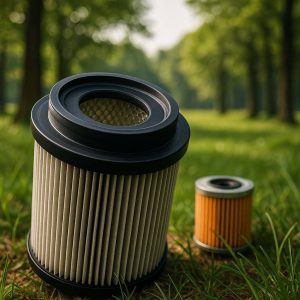Car filters have long played a quiet yet essential role in engine performance, air quality, and overall vehicle longevity. But as vehicle technologies evolve — from turbocharged combustion engines to electric drivetrains — the demands on filtration systems have grown dramatically. Enter nanotechnology and advanced materials, the next frontier in automotive filtration.
Modern filters are no longer just layers of paper or foam. They’re becoming smart, multi-functional barriers engineered at the microscopic level to capture ultra-fine particles, enhance performance, and adapt to extreme conditions.
In this article, we explore how the future of car filters is being shaped by cutting-edge innovations — and what this means for your car.
Why Traditional Filters Need an Upgrade

As engines become more efficient, they also become more sensitive to contamination. Even tiny particles can disrupt performance, increase wear, or trigger fault codes.
| Challenge | Why It’s a Problem |
|---|---|
| Ultra-fine particles (<1μm) | Traditional filters struggle to capture particles this small |
| Increased pressure/airflow | Modern engines need better flow without sacrificing filtration |
| Bio-contaminants & allergens | Cabin filters must now block bacteria, mold, viruses |
| EV-specific filtration needs | Less oil/fuel use, but more focus on cabin air and thermal control |
The need for filtration systems that do more with less is greater than ever. That’s where new materials come in.
What is Nanotechnology in Filtration?
Nanotechnology involves manipulating matter at the nanoscale — typically less than 100 nanometers. In filtration, this allows manufacturers to create fibers and membranes with precise pore sizes, advanced coatings, and even reactive surfaces.
Nanofibers
Nanofibers are thousands of times thinner than human hair. They form dense webs capable of trapping pollutants like:
-
Pollen, dust, PM2.5 and PM0.1 particles
-
Mold spores, bacteria, and viruses
-
Metal particles from engine wear
These webs offer high filtration efficiency with minimal airflow resistance, ideal for both engine air filters and cabin filters.
Advanced Materials Transforming Filters
Beyond nanofibers, next-gen car filters use a range of engineered materials for durability, flexibility, and enhanced performance.
| Material | Used In | Benefits |
|---|---|---|
| Electrospun polymers | Air & cabin filters | Ultra-fine filtration, high flow rates |
| Activated carbon + silver | Cabin filters | Odor removal, antibacterial, anti-viral |
| Metal mesh (stainless steel) | Performance filters | Washable, reusable, heat- and pressure-resistant |
| Graphene oxide | Air/fuel filters | Super-strong, flexible, anti-static properties |
| Bio-based nanocellulose | Cabin filters | Eco-friendly, sustainable, effective filtration |
Smart Filters: The Next Level
Emerging filter designs now include smart sensing elements that monitor clogging, flow rates, or contaminant levels. This opens the door to:
-
Predictive maintenance alerts on dashboards
-
Automatic regeneration in high-end fuel or oil filters
-
Variable porosity filters that adapt based on load or driving conditions
This integration of smart technology will reduce guesswork and extend service intervals, especially in commercial fleets and EVs.
Impact on Different Filter Types
Engine Oil Filters
-
Nano-enhanced media resist sludge and varnish buildup.
-
Magnetic nanoparticles capture metal wear particles.
-
Self-cleaning or bypass valves extend filter life.
Engine Air Filters
-
Use of nanofibers ensures up to 99.99% particle retention.
-
Some incorporate hydrophobic coatings to repel water and oil mist.
Cabin Filters
-
Multi-layer construction traps PM2.5 and ultrafine particles.
-
Embedded antimicrobial layers neutralize pathogens.
-
Activated carbon and ionizing layers remove odors and VOCs.
Fuel Filters
-
Advanced membranes block microscopic impurities and water molecules.
-
Essential for direct injection and biofuel compatibility.
Car Filters and Electric Vehicles (EVs)
You might assume electric vehicles need fewer filters — but that’s only partly true. While they don’t require fuel or traditional oil filters, thermal management and cabin filtration are more important than ever.
| EV Component | Filtration Need |
|---|---|
| Battery cooling systems | Fine fluid filters to prevent overheating |
| Cabin filtration | Higher-grade filters for silent cabins |
| HVAC heat pumps | Require clean, filtered air for efficiency |
Nanotech-enabled filters in EVs ensure passengers breathe clean air while protecting delicate electronic and thermal systems.
Environmental Benefits of Nanotech Filters
One of the often-overlooked advantages of advanced filters is sustainability. How?
-
Longer life: High-tech filters last longer, reducing waste.
-
Washable designs: Especially in performance or off-road vehicles.
-
Biodegradable materials: Emerging eco-filters use renewable cellulose.
-
Energy-efficient HVAC: Less airflow restriction means reduced power draw.
These innovations make vehicle filtration not only smarter but also greener.
What This Means for Drivers
Longer Intervals
New filters can last 2–3x longer than traditional ones, reducing replacement costs.
Better Health
Especially in urban environments, advanced cabin filters reduce exposure to allergens, diesel soot, and pathogens.
More Efficiency
Improved airflow helps maintain engine power and fuel economy.
Fewer Breakdowns
Enhanced filtration protects sensitive components — injectors, turbos, HVAC motors — from premature failure.
When Should You Upgrade?
You don’t have to wait for the future — many nano-enhanced and advanced-material filters are already on the market.
Consider upgrading if:
-
You drive in dusty or polluted urban areas
-
You suffer from allergies or asthma
-
You own a performance vehicle or EV
-
You want extended maintenance intervals
Where to Find Advanced Filters

Looking to upgrade your vehicle’s filtration system with next-gen tech?
Buy Car Filters online — Browse a wide selection of air, cabin, oil, and fuel filters engineered for the modern driver. Compatible with a wide range of vehicles, including hybrids and electric models.
Final Thoughts
The future of car filters is smarter, cleaner, and more efficient. Thanks to nanotechnology and advanced materials, tomorrow’s filters will offer better protection for engines, better health for passengers, and a smaller footprint on the environment.
As automotive systems become more sophisticated, filtration must keep pace. Whether you’re tuning a performance car, maintaining a fleet, or simply commuting in a modern EV, the right filter could make all the difference — now more than ever.